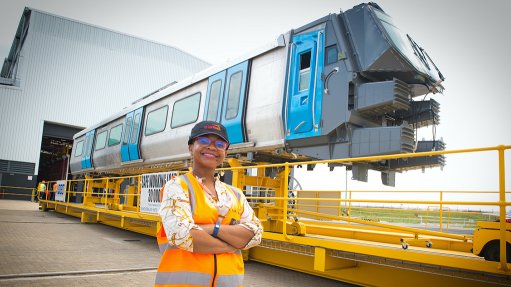
The Gibela train factory at Nigel
Gibela has, to date, delivered 66 of the 600 X’trapolis Mega commuter trains it is scheduled to deliver to the Passenger Rail Agency of South Africa (PRASA) by the end of 2028.
Eighteen of these trains were manufactured in Brazil, with the remaining 48 produced in a newly built plant in Nigel, on the East Rand, says Gibela head of communication Loyiso Jiya.
Gibela in 2013 signed a R53-billion contract to supply PRASA with 600 six-car trains for its Metrorail service. The Gibela shareholders are Alstom (61%), Ubumbano Rail (30%) and New Africa Rail (9%).
Jiya says production at the Nigel facility “was slowed slightly in 2020”, owing to Covid-19 and the related national lockdowns, but notes that manufacturing has now again started to gather steam.
“We’re very proud to have met the challenge we set ourselves, of making 25 train sets for PRASA [in the 2020/21 financial year], which was complicated by the Covid-19 pandemic.”
Jiya describes this as “a tremendous improvement on the ten train sets that were produced in 2019/20”.
The target for the 2021/22 financial year is 44 train sets, which translates to four train sets a month.
“In the 2022/23 financial year our production rate will be five train sets per month, and a year after it will be six train sets per month,” notes Jiya.
“We are increasing our factory capacity to set us up on a trajectory that will make us reach our target.”
Impact of Covid-19
The impact of Covid-19 on global logistics chains had a significant effect on Gibela’s local operations, says Jiya.
While about 90 of Gibela’s current suppliers are locally based, around 40 operate outside Africa – in Europe, Asia and South America.
“There have been strict limitations placed on shipping goods internationally,” says Jiya.
“Non-Covid-related goods are not prioritised like personal protection equipment, vaccines and related goods.
“The impact has been quite massive on Gibela. In fact, we’ve lost around ten trains through the resultant production delays. And, of course, Covid-19 is not over yet.”
Jiya says “robust supplier risk management” has allowed Gibela to anticipate some of the impact of the pandemic.
“We are grateful for the continued commitment of, and partnerships with, our local and global suppliers in enabling operations through the course of the various levels of lockdown in South Africa.”
He adds that PRASA is “very understanding of the situation, considering the force-majeure nature of these events”.
Jiya adds that Gibela saw a spike in Covid-19 cases in June as the country entered a third wave in infections.
“We experienced a rise in our cases impacting operations. Most of our suppliers were also affected by positive cases and this affected our June performance as material deliveries were delayed.
“We saw an increase in absenteeism, material shortages, and disruptions in operations due to decontamination procedures. However, we still managed to sell the targeted train sets in line with our monthly commitment to our customer.”
Local Content
Gibela is working towards a stabilised ratio of 65% local content – that is that 65 cents of every rand is spent in South Africa, explains Jiya.
“Of course, producing trains is an extremely technical field, so a key way of localising content is by bringing the expertise of international original equipment manufacturers to South Africa, in order to boost local skills and capabilities through contracts conducive to transformation and empowerment.
“Last financial year, we reported 43% local content, which will improve further as our suppliers continue to transform their own supply chains.”